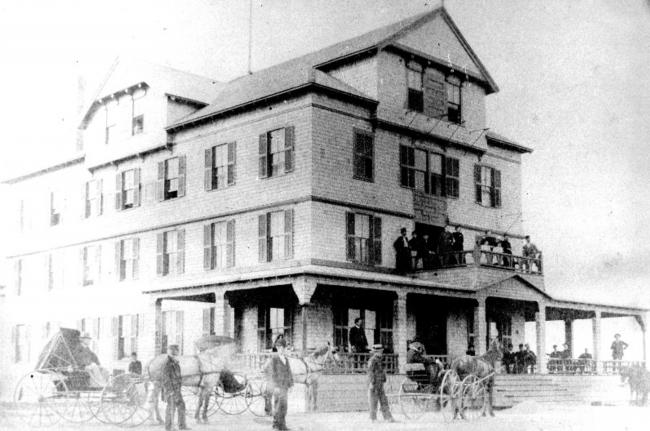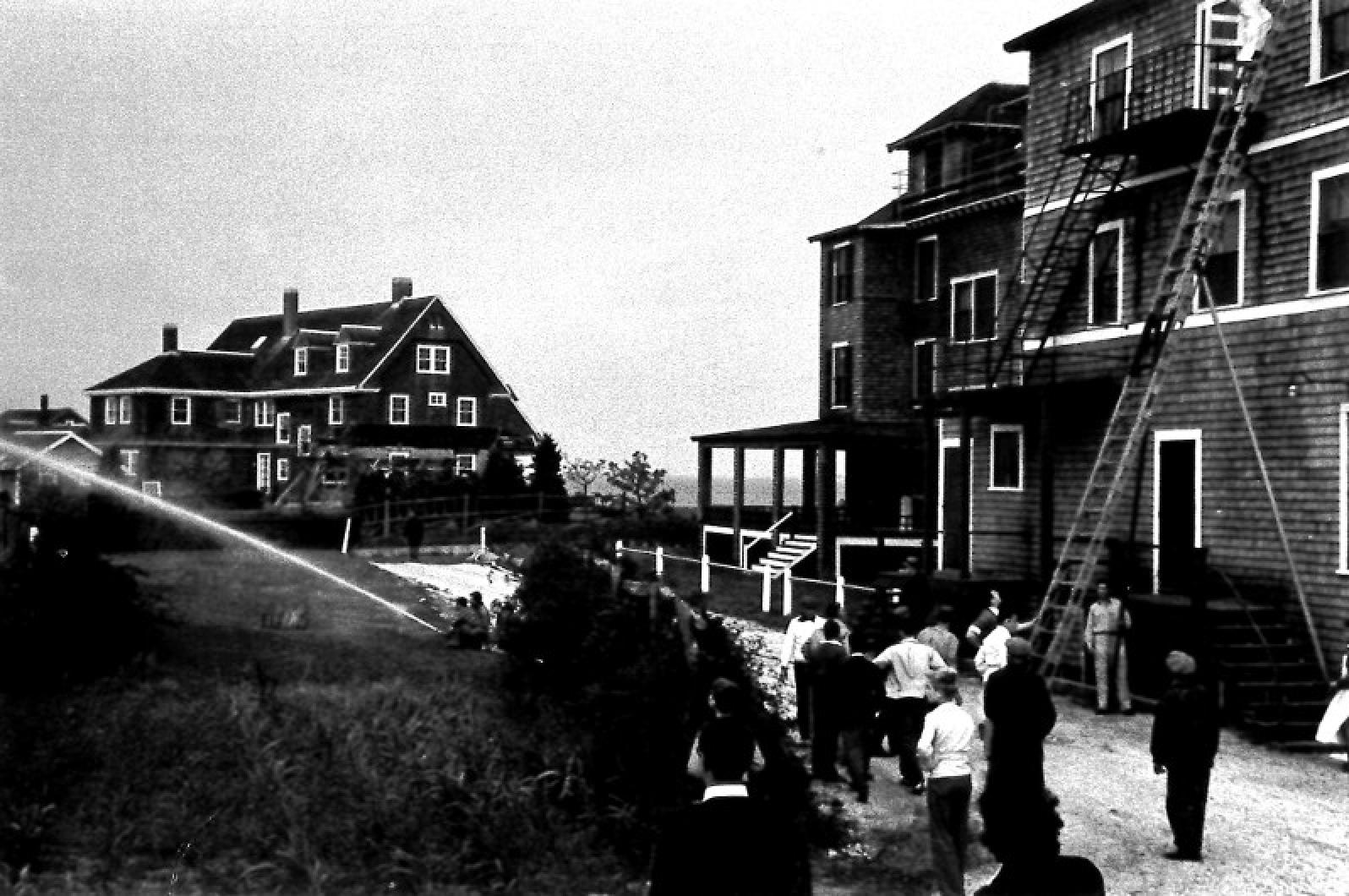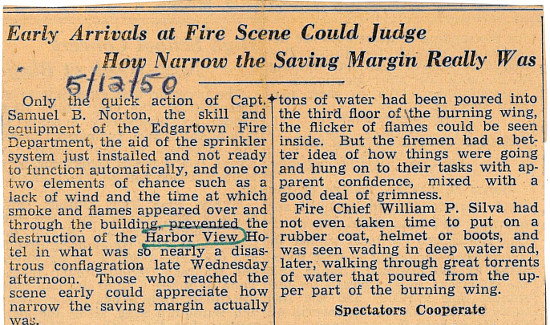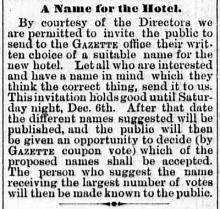Only the quick action of Capt. Samuel B. Norton, the skill and equipment of the Edgartown Fire Department, the aid of the sprinkler system just installed and not ready to function automatically, and one or two elements of chance such as a lack of wind and the time at which smoke and flames appeared over and through the building, prevented the destruction of the Harbor View Hotel in what was so nearly a disastrous conflagration late Wednesday afternoon. Those who reached the scene early could appreciate how narrow the saving margin actually was.
Captain Norton and Joe Santos of West Tisbury had been taking up some of the old privet hedge in front of the main building of the big hotel, and at about 5:20 they were about to depart for their last trip.
“Are my eyes as bad as that?” remarked Captain Norton, looking up.
“No, that’s fog,” said his helper.
Walking along a little way to get a better view, the captain saw the smoke issuing from the kitchen wing at the rear of the main building, and heard the crackling of the flames. He rang in the alarm on the telephone pole at the corner.
Flames Thrusting from Windows
By this time the flames were licking and thrusting from windows on the north side of the kitchen wing, principally from the third story, which is the top. There was some movement of air, but no real wind such as might have blown the fire into a fury.
Captain Norton stood on the corner by the alarm box and directed the first cars out of the way on the turnout across from the hotel on North Water street. One of the first cars at the scene was that of Alfred Hall, executive vice president of the hotel corporation, who has been in charge of the modernization of the Harbor View since it became a sort of community enterprise last fall.
The fire apparatus responded as promptly as usual and within minutes a small stream was playing on the shingled side of the burning wing. There could be no effective battle against the flames, however, until the big pumpers were hooked up with their full-size hose to the hydrants. This too was accomplished quickly, but bystanders were suffering tortures of anxiety while the firemen worked to hook on.
The flames seemed to increase and were fanning out from the third floor as well as licking up. The first on the scene watched smoke misting out of the tallest gable of the main hotel, in front of, and higher than the kitchen wing. This smoke, however, was from the fire below, and there was no blaze in the main hotel or within that gable.
From under the flat roof of the wing the smoke was issuing like smoke from a covered pot in which something is burning on a stove. For half an hour this effect continued even while the color of the smoke was changed and a mixture of steam gave evidence of the effect of the streams of water that were being poured into the building.
Worked in Clouds of Smoke
The firemen worked in the clouds of thick smoke and on ladders, not hesitating to take chances — or so it looked to the spectators. One group of firemen was assigned at the very beginning to the roof of the passage connecting the main hotel with the north building or annex. These men held their hose, pouring a heavy stream into the kitchen wing, although surrounded so densely by the smoke that they could be seen imperfectly from the ground.
Hose lines were run from the hydrant across from the hotel on Water street and from the hydrant near the foot of Fuller street. Chief of Police Marshall Geddis was on the spot promptly and took over the essential tasks of setting up lines to keep vehicular traffic out and keeping things clear for the firemen. No great, crowd gathered, however, the number on hand being smaller than most brush fires or oil heaters have brought out for years past.
On hand were a number of the hotel’s stockholders, an early summer visitor or two, and a sampling of townspeople in general. The stockholders were no more serious-faced than the rest a the spectators, and it was the owner of another hotel, R. L. Colter, who put into words the general feeling that the burning of the Harbor View would be a disaster for Edgartown.
For a while it seemed to many in the crowd that the firemen were no more than holding their own, and perhaps not that. The heat was obviously tremendous, and even after tons of water had been poured into the third floor of the burning wing, the flicker of flames could be seen inside. But the firemen had a better idea of how things were going and hung on to their tasks with apparent confidence, mixed with a good deal of grimness.
Fire Chief William P. Silva had not even taken time to put on a rubber coat, helmet or boots, and was seen wading in deep water and, later, walking through great torrents of water that poured from the upper part of the burning wing.
Spectators Cooperate
The spectators showed good sense and cooperation in keeping well out of the way, and it will be surprising if a single one of the new flower beds on the grounds turns out to have been stepped in except by the firemen unavoidably and in performance of their duty. Everybody was more concerned than excited, worried almost sick at moments lest the flames burst out again, or some firemen suffer injury, or a wind spring up.
Mrs. Charles H. Center, wife of the hotel manager, was observed at the height of the fire zealously guarding her flower garden in the rear of the establishment.
It is said of fire apparatus that a town always has too much of it at times when there is no fire, and too little when there is a fire. Edgartown seemed to have just what was needed, and every piece was disposed for greatest effectiveness. It may be said safely that the cost of all the equipment bought by the town in this generation was paid off in a single hour. If the Harbor View had burned, as it probably would have if outside help had been required because of lack of suitable equipment on the spot, the loss, direct and indirect, would have been incalculable. But the equipment was in readiness and on the spot.
The boys who had been working on the installation of the sprinkler system were inclined to think the turning on of the water in the system had been of real help.
“If it could have been on earlier!” said one. But if the system had been functioning, no large scale fire could have occurred.
Probably a good many of the spectators and some of the firemen were thinking that here at last was one of the emergencies so often talked and conjectured about for many a year — a big Harbor View fire. Here it was, and all the sense of danger rose strongly among the eyewitnesses.
Alfred Hall, guardian of the Harbor View’s new life, and Charles H. Center, manager, were outwardly calm, but it was easy to guess that Mr. Hall, especially, must have been doing some heavy thinking and worrying as he stood in the yard and looked up at the smoke escaping on every side of the flat roof as it would have around a pot lid.











Comments